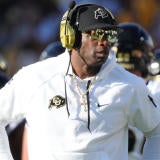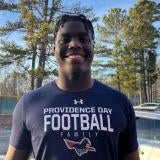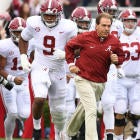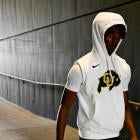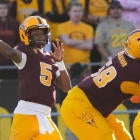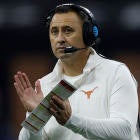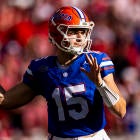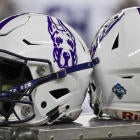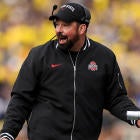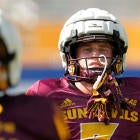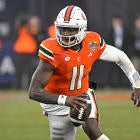Either directly, or by proxy, college football's national champion will have been forged in the fires of Nick Saban. At Alabama, Saban has set the standard in the sport and we all know what his formula is: a run-heavy offense and a 3-4 defense with a dominant front seven.
Saban's understudy, Kirby Smart, has adopted the same formula at Georgia and has quickly perfected it. He compiled the eighth-best rushing offense in the country and the third-best, non-option rushing team. His defense ranks sixth in the country, a just a few spots below the top ranked Crimson Tide.
So how do we pick a winner from such similar teams, each with only one loss at the hands of the same Auburn team.
I polled some coaches who have familiarity with both programs to get some of the strengths and challenges identified.
Who's tougher to defend? Talk to an SEC linebacker coach and it's Georgia's offense that scares him.
"[Georgia] schemes to get their guys the ball. [Alabama] just has guys."
For a linebacker coach, it's easy to see the challenge in trying to deal with the matchups that Georgia creates with Sony Michel in the run and pass game, Nick Chubb's downhill physicality and D'Andre Swift in some of his East-West packages.
"They've really evolved and grown," the coach said, "but the constant is that everything goes through the running backs."
But talk to an SEC defensive backs coach and Alabama's edge might be better.
"They have more matchups because of their talent on the outside," the coach said.
From the perspective of the defensive backfield, there's a lot to keep you up at night on the Alabama side. You can make a case that the running backs and offensive lines are a push, but Georgia doesn't have a dynamic threat like Calvin Ridley on the outside. There's also big play ability out of all of Alabama's complementary receivers, in particular the true freshmen trio of Jerry Jeudy, Henry Ruggs III and Devonta Smith. Good luck finding that kind of explosiveness for Georgia.
"Also the fact that Hurts can run makes it really hard to give outside help," the coach said. "They're really good."
One defensive coordinator believes Alabama presents more schematic challenges.
"Alabama forces you to prepare for more. They have a great receiver and great running back depth, and the quarterback run stuff is really challenging."
But at this point in the season, it's less about preparation and more about execution, and Georgia is executing as well as anyone in the country.
The more coaches you talk to, the more this becomes an "eye-of-the-beholder" debate on offense -- a pick your poison that's just different concentration levels of the same iodine.
At least on defense, there's some level of consensus.
Coaches seem to agree on a few things here: Alabama's three defensive interior spots are better than the anchors for Georgia. The Bulldogs' edge pass rushers are better than what the Tide bring to the table. If Alabama is healthy, the inside linebackers are practically a push. But given Alabama isn't healthy, Roquan Smith and friends likely get a slight edge. Meanwhile, there's a clear agreement that Alabama has an advantage in the secondary.
Still keeping up?
Georgia has the scariest rushing offense in college football. Alabama has the best run defense in college football. Alabama has one of the game's most dangerous run threats under center in Jalen Hurts. Georgia has one of the best quarterback-run antidotes in Roquan Smith (just ask Brandon Wimbush and Nick Fitzgerald).
Georgia survived an emotional shoot-out against Oklahoma three time zones away in its semifinal game. But it's Alabama that lost its starting outside linebacker (Anfernee Jennings) and starting offensive guard (Lester Cotton) in its wrestling match against Clemson.
There is no easy answer in this game. There is no secret stat. These are the two best teams in college football lining up and playing big-boy ball. As one offensive line coach told me, this "should be a blood bath of a game".







